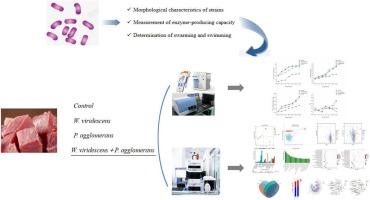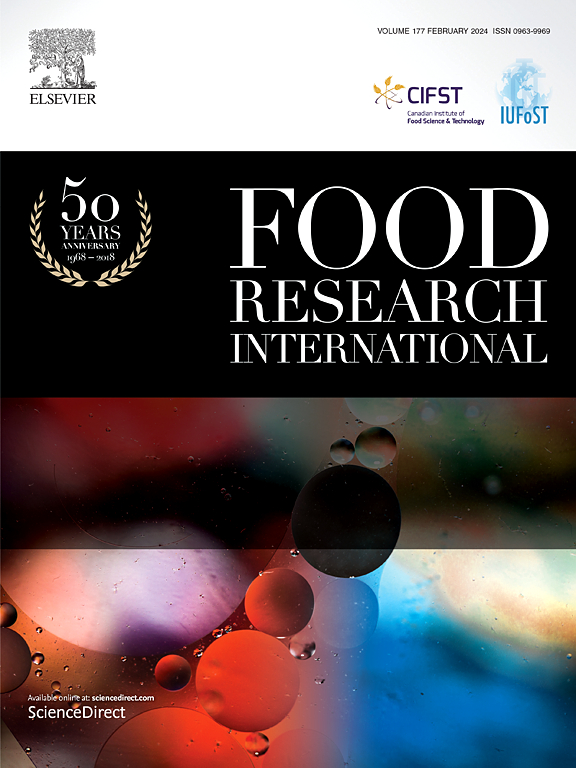Investigation of the spoilage effects of interactions between dominant spoilage bacteria W. viridescens and P. agglomerans on marinated beef
IF 8
1区 农林科学
Q1 FOOD SCIENCE & TECHNOLOGY
引用次数: 0
Abstract
The industrial production of marinated beef frequently encounters challenges such as short shelf-life and high risk. Traditional studies have primarily focused on the spoilage capacity of a single dominant bacterium, while overlooking microbial interactions. In this study, isolated W. viridescens and P. agglomerans were inoculated into marinated beef individually and in combination to analyze their main metabolic pathways and interaction mechanisms. Results showed that P. agglomerans exhibited stronger motility and environmental adaptability compared to the W group, enabling rapid decomposition of proteins and lipids. Its metabolic pathways were mainly related to amines, phospholipids, and lipids, which promote deamination and transamination, resulting in significant changes in TVB-N, TCA-soluble peptides, and texture. Compared with single-strain groups, the coexistence of both bacteria did not further enhance spoilage capacity but induced remarkable metabolic pathway alterations. In the WP group, the group's main differential metabolites were proline, leucine, lysine, phenylalanine, riboflavin, inosinic acid, and guanine. Under the combined action of W. viridescens and P. agglomerans, the ABC transporter, leucine, isoleucine, and valine metabolic pathways were significantly up-regulated, while the FoxO signaling pathway and aminoacyl-tRNA biosynthesis were downregulated. The two bacteria compete for nutrients to maintain intracellular metabolic balance. This study revealed the metabolic pathway and mechanism of microbial spoilage of W. viridescens and P. agglomerans in the spoilage process of marinated beef, which can optimize the production process, reduce spoilage, and lay a theoretical foundation for the precise preservation strategy of the marinated beef industry.

优势腐败菌W. viri下降菌与P.团聚菌相互作用对腌制牛肉腐败效应的研究
腌制牛肉的工业化生产经常遇到保质期短、风险高的挑战。传统的研究主要集中在单一优势细菌的腐败能力上,而忽略了微生物的相互作用。本研究将分离的病毒下降W.和团聚P.分别和联合接种到腌制牛肉中,分析了它们的主要代谢途径和相互作用机制。结果表明,与W组相比,P. agglomerans表现出更强的运动性和环境适应性,能够快速分解蛋白质和脂质。其代谢途径主要与胺类、磷脂类和脂类有关,促进脱氨和转氨作用,导致TVB-N、tca可溶性肽和质构发生显著变化。与单菌种组相比,两种细菌的共存并没有进一步提高腐败能力,但却引起了显著的代谢途径改变。WP组主要差异代谢物为脯氨酸、亮氨酸、赖氨酸、苯丙氨酸、核黄素、肌苷酸、鸟嘌呤。在毒降W. viridowns和聚块P. agglomerans的共同作用下,ABC转运体、亮氨酸、异亮氨酸和缬氨酸代谢途径显著上调,FoxO信号通路和氨基酰基trna生物合成下调。这两种细菌为维持细胞内代谢平衡而竞争营养。本研究揭示了毒降弧菌和凝聚弧菌在腌制牛肉腐坏过程中微生物腐坏的代谢途径和机制,可以优化生产工艺,减少腐坏,为腌制牛肉行业的精准保鲜策略奠定理论基础。
本文章由计算机程序翻译,如有差异,请以英文原文为准。
求助全文
约1分钟内获得全文
求助全文
来源期刊

Food Research International
工程技术-食品科技
CiteScore
12.50
自引率
7.40%
发文量
1183
审稿时长
79 days
期刊介绍:
Food Research International serves as a rapid dissemination platform for significant and impactful research in food science, technology, engineering, and nutrition. The journal focuses on publishing novel, high-quality, and high-impact review papers, original research papers, and letters to the editors across various disciplines in the science and technology of food. Additionally, it follows a policy of publishing special issues on topical and emergent subjects in food research or related areas. Selected, peer-reviewed papers from scientific meetings, workshops, and conferences on the science, technology, and engineering of foods are also featured in special issues.
 求助内容:
求助内容: 应助结果提醒方式:
应助结果提醒方式:


